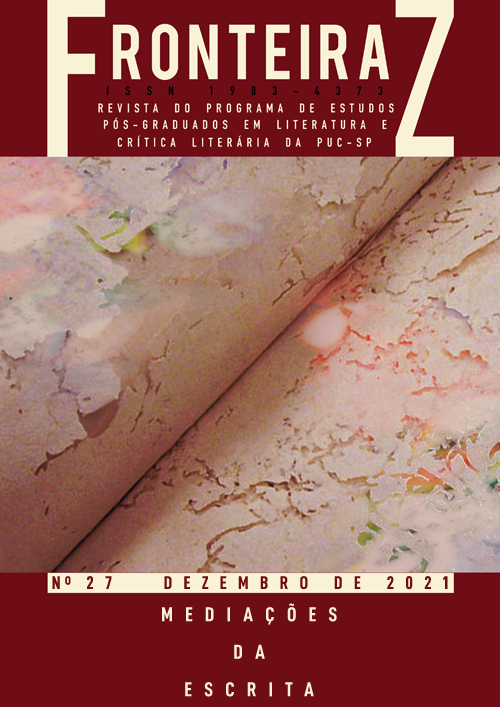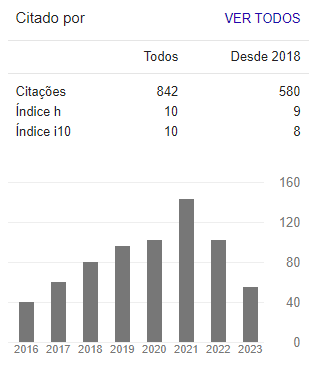Do som ao traço:
o aspecto musical como processo de composição do poema
DOI:
https://doi.org/10.23925/1983-4373.2021i27p65-78Palavras-chave:
Oralidade, Performance, Antiguidade, Poéticas da voz, RitmoResumo
O objetivo deste artigo é demonstrar como os traços musicais, desde a escolha dos instrumentos, passando pelo uso das unidades métricas até a oralidade, constituem uma parte fundamental do processo de composição dos poemas na antiguidade. Para isso, discutiremos a definição dos gêneros poéticos na Antiguidade Clássica, isto é, entre os gregos e romanos, e também buscaremos expandir essa própria noção de “clássico”, ao investigar a oralidade em algumas poéticas de matrizes africanas. Trata-se de uma tentativa de recuperar uma dimensão performática capaz de evidenciar uma singularidade e também de compreender melhor as potencialidades de afecção de cada poema. Em suma, é um movimento teórico que busca recolocar o corpo no centro da enunciação, dentro de comunidades baseadas na comunicação oral, a partir das teorizações de Ruth Finnegan, o que certamente pode gerar ruídos significativos ao longo das transmissões.
Referências
ANTUNES, C. L. B. Ritmo e sonoridade na poesia grega antiga: uma tradução comentada de 23 poemas. São Paulo: Humanitas, 2011.
CASTRO, Y. P. Marcas de africania no português do Brasil: o legado negroafricano nas Américas. Interdisciplinar, Aracaju, v. 24, ano XI, p. 11–24, 2016.
CRUZ, A. S. Canto-poema e samba-blues: estratégias poéticas afrodescendentes na poesia de Almeida Pereira. In: FERREIRA, E.; MENDES, A. M. (Org.). Literatura afrodescendente: memória e construção de identidades. São Paulo: Quilombhoje, 2011, p. 13-22.
FINNEGAN, R. Oral poetry: its nature, significance and social context. Cambridge: Cambridge University Press, 1977.
FLORES, G. G. Uma poesia de mosaico nas Odes de Horácio: comentário e tradução poética. 2014. 413 f. Tese. (Doutorado em Letras Clássicas e Estudos da Tradução) – Universidade de São Paulo, São Paulo.
HEGEL, G. W. F. Estética: I – IV. Trad. Álvaro Ribeiro e Orlando Vitorino. Coimbra: Almedina, 1993.
HUIZINGA, J. Homo ludens: o jogo como elemento da cultura. 7. ed. São Paulo: Perspectiva, 2012.
MALTA, A. A Musa difusa: visões da oralidade nos poemas homéricos. São Paulo: Annablume, 2015.
NAGY. G. Questões homéricas. Trad. Rafael Rocca dos Santos. São Paulo: Editora Perspectiva, 2021.
NETO, J. A. O. Dos gêneros da poesia antiga e sua tradução em português. 2013. 262 f. Tese (Livre docência em Letras Clássicas) – Universidade de São Paulo, São Paulo.
PEREIRA, E. A. A saliva da fala. Rio de Janeiro: Azougue, 2017.
SILVA, C. M.; FREITAS, S. R. F. Os cantopoemas dentro do Congado: uma oralitura de identidade e resistência negra. Identidade!, São Leopoldo, v. 21, n. 2. p. 210-217, 2016.
THOMAS, R. Letramento e oralidade na Grécia antiga. Trad. Raul Fiker. São Paulo: Odysseus Editora, 2005.
WEST, M. Studies in Greek elegy and iambus. Berlim: De Gruyter, 1974.
Downloads
Publicado
Como Citar
Edição
Seção
Licença
Copyright (c) 2021 FronteiraZ. Revista do Programa de Estudos Pós-Graduados em Literatura e Crítica Literária

Este trabalho está licenciado sob uma licença Creative Commons Attribution-NonCommercial 4.0 International License.







 Este obra está licenciada com uma Licença
Este obra está licenciada com uma Licença 